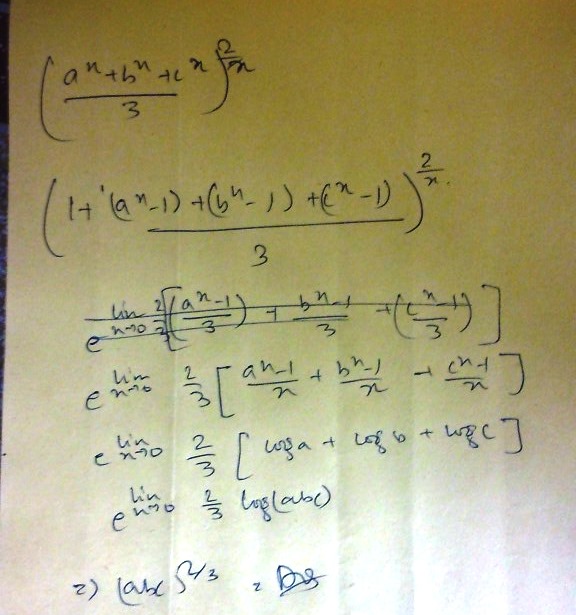
1. lim x→0(1+x)1/x-e+12exx2
2. lim x→0(ax+bx+cx3)2/x
-
UP 0 DOWN 0 0 7

7 Answers
\hspace{-16}\bf{(1)::\;\;} $Given \; $\bf{\displaystyle \lim_{x\rightarrow 0}\frac{(1+x)^{\frac{1}{x}}-e-\frac{1}{2}ex}{x^2}}}$\\\\\\ First we will find expansion of $\bf{\displaystyle \bf{(1+x)^{\frac{1}{x}}}$ at $\bf{x=0}}$\\\\\\ Let $\bf{\displaystyle \bf{y = (1+x)^{\frac{1}{x}}}$\\\\\\ Taking $\bf{\log}$ on both side, We Get\\\\\\ $\bf{\ln(y)=\frac{1}{x}.\ln(1+x)=\frac{x-\frac{x^2}{2}+\frac{x^3}{3}+......}{x}}$\\\\\\ Now when $\bf{x\rightarrow 0\;,}$ Then higher terms of $\bf{x}$ are very small.\\\\\\ So we can write the given expression as \\\\\\$\bf{\ln(y)=1-\frac{x}{2}+\frac{x^2}{3}}$\\\\\\ $\bf{y=e^{1-\frac{x}{2}+\frac{x^2}{3}}=e-ex+\frac{11e}{24}.x^2+.....}$\\\\\\ (Using the formula $\bf{e^{X} = 1+\frac{X}{1!}+\frac{X^2}{2!}+.......\infty}$)\\\\\\ Now We Calculate Limit\\\\\\
\hspace{-16}\bf{\lim_{x\rightarrow 0}\frac{(1+x)^{\frac{1}{x}}-e+ex}{x^2}}$\\\\\\ Using Expansion of $\bf{(1+x)^{\frac{1}{x}}}$\\\\\\ $\bf{\lim_{x\rightarrow 0}\frac{\left(e-ex+\frac{11e}{24}x^2+...\infty\right) -e+ex}{x^2}}$\\\\\\ So $\bf{\lim_{x\rightarrow 0}\frac{(1+x)^{\frac{1}{x}}-e+ex}{x^2}=\frac{11e}{24}}$
 Sohini Marik i cant understand how to go from line 9 to line 10. plz helpUpvote·0· Reply ·2014-06-10 07:30:48
Sohini Marik i cant understand how to go from line 9 to line 10. plz helpUpvote·0· Reply ·2014-06-10 07:30:48
using AM GM im getting (abc)2/3.. i dont know if thats the answer..
 Sohini Marik please ignore this one. mistake
Sohini Marik please ignore this one. mistake
sory ...
my ans is e2(ln a +ln b + ln c )/3
 Himanshu Giria i just aplied La Hospital's rule..
Himanshu Giria i just aplied La Hospital's rule.. Himanshu Giria after taking log on both sides ...
Himanshu Giria after taking log on both sides ...

\hspace{-16}\bf{(2)::\;\;} $Given \; $\bf{\displaystyle \lim_{x\rightarrow 0}\left(\frac{a^x+b^x+c^x}{3}\right)^{\frac{2}{x}}}$\\\\\\ Using $\bf{A.M\geq G.M\;,}$ we get\\\\\\ $\bf{\left(\frac{a^x+b^x+c^x}{3}\right)\geq \left(a\cdot b\cdot c\right)^{\frac{x}{3}}}$\\\\\\ and equality hold when $\bf{a^x = b^x = c^x}$\\\\\\Now when $\bf{x\rightarrow 0\;,}$ Then $\bf{a^x=b^x=c^x = 1}$\\\\\\ So we can write it as\\\\\\ $\bf{\lim_{x\rightarrow 0}\left(\frac{a^x+b^x+c^x}{3}\right)=\lim_{x\rightarrow 0}\left(a\cdot b\cdot c\right)^{\frac{x}{3}}}$\\\\\\ So $\bf{\lim_{x\rightarrow 0}\left(\frac{a^x+b^x+c^x}{3}\right)^{\frac{2}{x}}=\lim_{x\rightarrow 0}\left(a\cdot b\cdot c\right)^{\frac{x}{3}\cdot \frac{2}{x}} = \left(a\cdot b\cdot c\right)^{\frac{2}{3}}}$
in the 2nd one 2/x is ijn power or wat ???
 Himanshu Giria or product...
Himanshu Giria or product... Sohini Marik its in power
Sohini Marik its in power Himanshu Giria 2(ln a +ln b + ln c )/3
Himanshu Giria 2(ln a +ln b + ln c )/3
 Himanshu Giria ???
Himanshu Giria ???
 Sohini Marik i dont know the answer
Sohini Marik i dont know the answer Sahil Jain 1. 11e/24
2. Abc power 2/3
Sahil Jain 1. 11e/24
2. Abc power 2/3